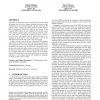Free Online Productivity Tools
i2Speak
i2Symbol
i2OCR
iTex2Img
iWeb2Print
iWeb2Shot
i2Type
iPdf2Split
iPdf2Merge
i2Bopomofo
i2Arabic
i2Style
i2Image
i2PDF
iLatex2Rtf
Sci2ools
111
click to vote
CCS
2008
ACM
2008
ACM
Mitigating DNS DoS attacks
This paper considers DoS attacks on DNS wherein attackers flood the nameservers of a zone to disrupt resolution of resource records belonging to the zone and consequently, any of its sub-zones. We propose a minor change in the caching behavior of DNS resolvers that can significantly alleviate the impact of such attacks. In our proposal, DNS resolvers do not completely evict cached records whose TTL has expired; rather, such records are stored in a separate "stale cache". If, during the resolution of a query, a resolver does not receive any response from the nameservers that are responsible for authoritatively answering the query, it can use the information stored in the stale cache to answer the query. In effect, the stale cache is the part of the global DNS database that has been accessed by the resolver and represents an insurance policy that the resolver uses only when the relevant DNS servers are unavailable. We analyze a 65-day DNS trace to quantify the benefits of a st...
Related Content
| Added | 12 Oct 2010 |
| Updated | 12 Oct 2010 |
| Type | Conference |
| Year | 2008 |
| Where | CCS |
| Authors | Hitesh Ballani, Paul Francis |
Comments (0)

